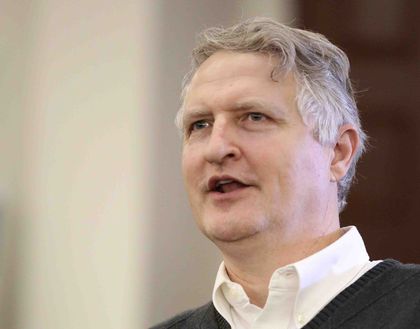Paul Copan, Chair of Philosophy and Ethics at Palm Beach Atlantic University, analyses why people leave the faith, and how they find reasons to return.
 Photo: Taylor Jacobs, Unsplash (CC0).
Photo: Taylor Jacobs, Unsplash (CC0).
Everybody knows individuals who have abandoned the Christian faith for many different reasons, as well as others who have returned to the beliefs they once left.
According to the Chair of Philosophy and Ethics at Palm Beach Atlantic University, Paul Copan, “de-conversion can be very painful, because you are leaving behind what has been very familiar and secure”.
Some common causes of people leaving the Christian faith are “problems with the Scriptures [...] certain doctrines or the hypocrisy in the church”. It can also be that they struggle with “the problem of evil, thinking why God does not act”.
Copan puts the example of C. S. Lewis, who “realized that his atheism was far to simple to make sense of what was going on in the world”.
“So often people will be sidetracked by mere rational arguments, and overlook some of those important practical concerns that face all of us as human beings day by day”, the author said in an interview at the European Leadership Forum in Wisla, Poland.
In order to help people to find their way back,“those deep longings that we have should also be considered, it is not just rational arguments”.
Read the interview below.
 Paul Copan. Photo: Palm Beach Atlantic University.
Paul Copan. Photo: Palm Beach Atlantic University.Question. What does it mean to de-convert from the Christian faith?
Answer. With the topic of de-conversion, of why the people leave the Christian faith, there are often several stages or steps that people go through.
First, it begins with doubts, and then questions arise in their minds like “can this really be right?, or what about that?”; or maybe they have a certain encounter with deep problems and they start to be critical to the point that they start to question everything, to distance themselves, and then eventually there is a departure.
There is a de-conversion that can be very painful, because you are leaving behind what has been very familiar, comfort, secure and so forth, and also disappointing families, those who have been committed to raising someone up in Christian faith.
When someone becomes a Christian out of the Muslim or Hindu settings, there is often a stronger reaction, it can be excommunication, or even your life can be under threat. It can be a much more extreme situation coming the other way, so to speak.
Q. Why do stories of de-conversion often seem so compelling?
A. One of the reasons why the stories of de-conversion seem compelling, is because, if the person grew up in that setting, secularists and atheists use it as a claim to say that the person has credibility because he has seen it all and reject it.
It seems to add further fuel to the fire for the case against Christianity. It reinforces stereotypes about strict religious upbringing, how restraining it is, or that you cannot think by yourself, etc.
For that reason, that person who was an insider and come out as an outsider, gets a lot more credibility than those who stay in that circle and have not come out of it.
Q. What are some common causes of people leaving the Christian faith?
A. When those who have left the Christian faith talk about why they did it, they usually talk about how they did not see how the Christian faith fits with doing science, for example, they see a conflict.
They might also find that there are some problems with the Scriptures, maybe problems related to Old Testament ethical issues, for example.
It could be simply that they are facing the problem of evil, thinking: “Why does not God act?”, or facing a personal crisis themselves, where God seems to be removed and they wonder how can He allow this evil to proliferate.
There can be other reasons, like certain doctrines, maybe the doctrine of hell, or the hypocrisy in the church, that has turn people off the faith.
Q. Why does the problem of evil actually point towards God?
A. The problem of evil reminds us what C. S. Lewis said, that we cannot judge something to be crooked, unless we have an idea of what a straight line is.
C.S. Lewis himself recognised, in his own departure from atheism, that he was angry at a God who allows to much cruelty and injustice. But then he asked: “Where did my idea of injustice come from?”
He said that, if the whole show was meaningless from the beginning to the end, how is that he found at least one part of that, namely, the issue of justice and injustice, so full of meaning?
He realized that his atheism was far to simple to make sense of what was going on in the world.
He recognised that atheism has two problems: one is the problem of evil, which everyone has to deal with. But there is also the problem of goodness: where does that standard come from if we are simply the product of this blind, deterministic, non-conscious, valueless process?
God offers us a better context for making sense of evil then, if we dispense with God.
Q. How can those who have left the faith find reasons to return?
A. Those who leave the Christian faith, can be encouraged to look at the stories of those who have actually come back to the Christian faith, to look at the reasons. And keep in mind as well that all those reasons are not the same, people find their way to God in different ways.
Some people might be persuaded by philosophical arguments. They might have dismissed them earlier on, but come back and realize that those arguments were actually pretty good, that there is a greater strength in those arguments than he first realized.
It could be through a literary pathway, sometimes the use of imagination. The literary turn can actually help people to see things from a different way, it opens up new pathways, it gives new ways to see things that you do not get from arguments for God's existence, for example.
Another reason might be that their atheism was simply inadequate to account for dealing with death, or to deal with issues of shame, guilt, or the need for forgiveness.
Francis Spufford wrote a book called Unapologetic, and the subtitle is How Christianity can make surprising emotional sense.
He found that when he was way down with guilt, the refuge for him was to find grace, the grace of forgiveness in Jesus Christ. He knew he was a moral failure and needed something to heal that damaged conscience. That was in the gospel, and he found a pathway forward.
All those existential concerns are important: guilt, the need for security and significance, the need to overcome our fear of death. Those deep longings that we have should also be considered, it is not just rational arguments.
So often people will be sidetracked by mere rational arguments, and overlook some of those important practical concerns that face all of us as human beings day by day.
Sometimes it is trough the church, people are impressed by what they see going on in the life of the church. Or they might just read about Jesus and the gospel, like Michael Bird, a noted New Testament scholar, who saw the Jesus that was not fairly portrayed in the media and elsewhere.
As he read the gospels, he was so struck and moved, even within his own heart, about who this Jesus is, and how He offered forgiveness, how He spoke with authority and command, and power - and that was transformative for him.
All these are a few things to keep in mind, as we help people to find their way back.
ABOUT PAUL COPAN
Paul Copan (Ph.D. Philosophy, Marquette University) is the Pledger Family Chair of Philosophy and Ethics at Palm Beach Atlantic University, West Palm Beach, Florida.
For six years, he served as president of the Evangelical Philosophical Society. He is author and editor of over thirty books, including works such as The Rationality of Theism, The Routledge Companion to Philosophy of Religion, Creation out of Nothing, Philosophy of Religion: Classic and Contemporary Issues, The Zondervan Dictionary of Christianity and Science, A Little Book for New Philosophers, and The Cosmological Argument (a two-volume anthology).
He has also contributed essays to over thirty books, both scholarly and popular, and has authored a number of articles in professional journals.
In 2017, he was a Visiting Scholar at Oxford University. Paul and his wife, Jacqueline, have six children, and they reside in West Palm Beach, Florida.

Las opiniones vertidas por nuestros colaboradores se realizan a nivel personal, pudiendo coincidir o no con la postura de la dirección de Protestante Digital.
Si quieres comentar o